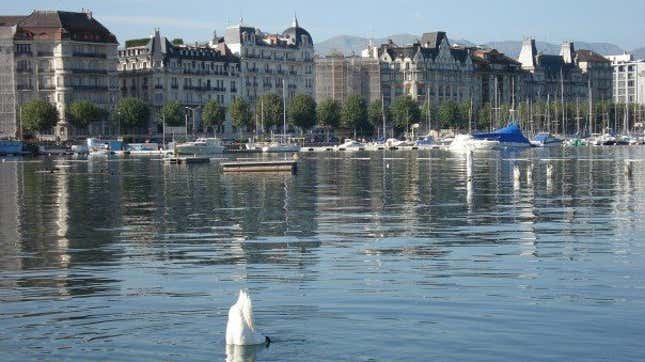
There’s an argument to be made that Switzerland is the most perfect country in the world: It has the most democratic system of government ever created, unemployment runs around 3%, the economy is diversified and competitive, salaries are staggeringly high, working hours are relatively low, holidays are plentiful and did I mention that the landscape is one of the most breathtaking on the planet?
People flock to Switzerland not only for skiing and hiking but also to make large sums of money in banking, luxury goods and international organizations. I first came to Switzerland as a student and then as an employee of the Canadian government at the United Nations. I now live here part time for the excellent cheese and the very central location for traveling Europe. Despite its apparent perfection, living in the Confoederatio Helvetica (CH), the country’s proper name, took some getting used to.
Bland is better
For those who have never been to Geneva, the city conjures up images of luxurious hotels, Rolex watches, swanky boutiques and fancy cars. That was what I had imagined before arriving for the first time in 2006. Yet, as I pulled my luggage through the streets of the city, I began to realize that nothing could be further from the truth. Geneva’s location is pretty but the city is surprisingly bland, with restaurants that have not changed since the 1960s, sparse drinking establishments and Europe’s least bustling historic center. Far from a swanky, cosmopolitan city, Geneva is quaintly provincial and, like in many other Swiss cities, most residents live in uninspiring concrete square pastel apartments that would not have been out of place in the former Soviet Union.
Yet, native Genevois, and the Swiss more generally, would have it no other way. Modesty is a virtue in Switzerland, along with cleanliness. Multimillion dollar lakeside properties will often have a standard 4-cylinder car in the driveway.
“Switzerland is not a country of extremes,” says Diccon Bewes, English expat and author of the book Swiss Watching. “Public displays of wealth are frowned upon and affluence is more on display inside people’s homes, not outside.” Ironically, the Swiss make products for the most immodest among us from Bally to Breitling, despite the fact that it is rare to see a Swiss wearing them.
A life dictated by store hours
I’ve been having a recurring nightmare for years in which doctors find that I’m harboring an alien inside me and it is pushing through my skin ready to burst out. There’s only one medication that can save me. Doctors at the hospital give me the prescription for it and I charge through the empty streets of Geneva searching for an open pharmacy but they are all locked.
I would probably put the dream down to some pent up childhood angst if it hadn’t been so close to reality. While living in Geneva in 2009 I was diagnosed one evening with a nasty parasitic infection that resided in my body and there was only one medication that could cure it. That led to a frantic search for an open pharmacy at around 7 pm, just the time when everything—I mean everything—shuts down. After 7 p.m., in most parts of the country you’re lucky to find a corner store open to buy gum.
This is a mandated inconvenience. The Swiss have consistently voted in referendum after referendum to maintain strict business hours. On Saturday, stores close promptly at 5 p.m., with some closing as early as 2 p.m. On Sunday, all stores are closed, including supermarkets and many gyms. In residential buildings, including my own, moving furniture, cutting the grass and even doing laundry are often strictly prohibited on Sunday.
There are a few reasons for these sometimes unbearably limited hours except for the fact that high wage labor makes long hours restrictive to small businesses. Some women say that it is another element forcing them to stay home and shop while the men work—Switzerland being notoriously slow on women’s liberation, with national suffrage granted to woman in 1971. The Swiss are also very serious about their downtime and shopping is not relaxing—including shopping for vital medications.
The voice of reason
I have a Swiss friend, Markus, who we refer to as the “voice of reason,” for his incredibly measured and sensible answers to every problem. Controversial topics and heated discussions are reduced to finding a middle ground and passion is tempered by his unrelenting Swiss German logic—making me wonder about Swiss Italians, who seem like contradictions in terms.
The Swiss are a sensible people. Trapped between four proud nations that are sometimes prone to ultra-violence, the Swiss are too logical to take sides—they are, of course, armed but neutral—and too measured to act impulsively. This is best displayed in the country’s referenda, which are frequent and astonishingly democratic. Far from the populist tyranny that characterizes California’s self-defeating direct democracy, the Swiss tend to put personal feelings aside and act for the good of their community when voting. It has kept the Swiss out of the European Union and out of the euro zone, which they were lambasted for initially but now seem to have been prescient.
The most famous recent example is the rejection of a law that would have given everyone six weeks of paid vacation. The initiative, proposed by a large trade union, was rejected by nearly 70% of Swiss voters who thought taking extra time off would be bad for the country. Markus, of course, concurs: “Who would pay the bills and keep the economy moving?”
Despite its peculiarities, the body and mind have an odd way of adapting to the Swiss lifestyle. My grocery shopping has become more efficient, my punctuality has improved and all the tranquility has made me calmer. The Swiss just may be onto something.